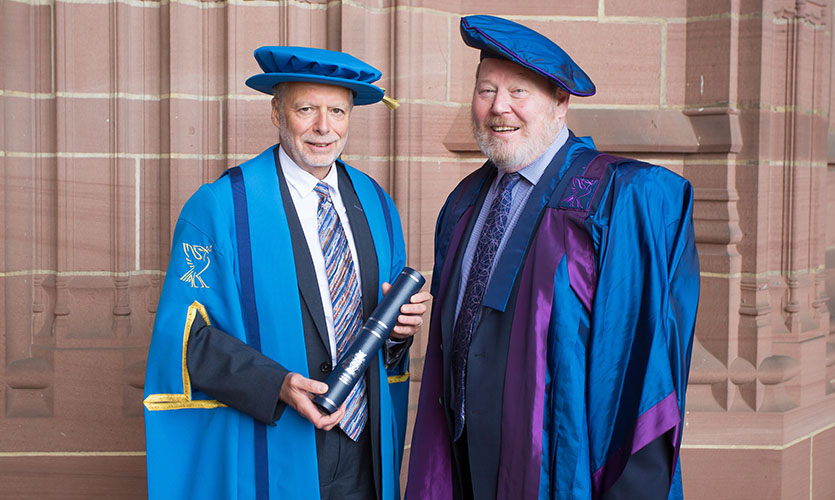Professor Roger Webster

Professor Roger Webster is the former Executive Dean of the Faculty of Arts, Professional and Social Studies and Professor of Literary Studies at the university. He was awarded an Honorary Fellowship by LJMU in 2017 for his outstanding contribution to arts and cultural education.
Roger was born in Liverpool and spent the first 5 years of his life there; his father was Head of English at the Liverpool Institute and taught Paul McCartney, George Harrison, Peter Sissons and others of that inspirational generation.
The family moved to Dorset when Roger was 6 years old, leaving behind what he refers to as the sketchy ‘black and white memories’ of foggy days, dark buildings, docks, the overhead railway and trams – not the colourful Liverpool of today.
Roger studied English at London University and went on to complete a PhD with a thesis on the novels of Thomas Hardy. His academic career progressed with teaching positions at the University of London, City and East London College and the American Institute; in 1978 he returned to Liverpool and became the youngest member of teaching staff in the English Department of the then City of Liverpool College of Higher Education, soon to merge with Liverpool Polytechnic.
By the time the polytechnic was granted university status in 1992, Roger was a Professor in Literary Studies and leading the new School in Media, Critical and Creative Arts. Drawing upon Liverpool’s creative spirit and talent, Roger and his team developed a new portfolio of professional degrees in creative writing, journalism, criminology, and media production laying the foundations for what is now an area of strength both in LJMU and the city in creative and broadcast media.
The school’s innovative approach, one that is now widely adopted, was that it created programmes in collaboration with industry and forged partnerships with external organisations such as Mersey Television, FACT, The Tate, Biennial and various news, media and arts organisations around the city. For students this meant much work-based experience and also significant contributions to courses from practitioners in the creative, cultural and media industries – for example lectures, seminars and masterclasses from a range of guests such as Steven Spielberg and Alastair Campbell.
These relationships provided an authentic pathway and experiences for students into the new digital, creative and cultural industries – and also contributed to city’s bid to become European Capital of Culture in 2008. As lead Dean of Faculty, he was also responsible for two major capital projects, the John Lennon Art and Design Building, and the Redmonds Building.
“Roger is truly part of that history, his is a story of commitment and passion for this university, he has dedicated his life to transforming the lives of his students and staff through the engine of higher education and it is a testament to his integrity and character that after a long career at the very top of this institution, the news of his fellowship was met with widespread delight and affection.”
– Broadcaster Roger Philips speaking at Professor Webster’s inauguration as a fellow in 2017

Acknowledged as a mover and shaker in the arts and cultural landscape, Roger remains a committed academic; he has published on a range of areas including Thomas Hardy, Joseph Conrad, working-class writing, literature and film and the visual arts, suburbia, and literary theory. He also sat on various national committees for English, and for the arts and humanities.
In retirement he was commissioned by the then Vice-Chancellor, Professor Nigel Weatherill, to write on the origins and history of LJMU. He spent 18 months completing the book, The Making of a Modern University, which was launched in 2017 for the university’s 25th anniversary.
LJMU’s Corporate Communications team caught up with Roger during the Bicentenary celebrations of 2023 to ask him about the process of bringing the book together. He said: “It was a real privilege to write the history of the university: I interviewed many people who had contributed to its more recent history from the 1960s onwards, whether as staff, former students, governors, Vice-Chancellors and Chancellors – and that often moving experience did reflect what a remarkable institution the University has become from its origins.”
One of the problems he encountered when initially embarking upon the project was the lack of historical material held within the university. With the help of an excellent archivist, original documents and data were located which provided much rich material for Roger to incorporate into the book. The project really helped to enhance what LJMU now has catalogued through its Special Collections and Archives housed in the Aldham Robarts Library.
Roger explained: “The university had not really kept much in the way of archives or maintained records apart from minutes of governors’ meetings which did not go back very far. The library had established a special collections unit for certain academic areas, and one of the successful outcomes of the history project was to locate and collect much diverse material about the university’s past, which is now being further developed and consolidated by the special collections team: we do need to have access to our past in order to understand our identity as an institution. I’ve also donated a considerable amount of material relating mainly to design and fashion from personal family collections.
“My favourite archive collections would be the photographs which have survived from the late nineteenth and early twentieth centuries which speak volumes about the activities and environment of the pioneering constituent institutions which continue today within the university – in areas such as sport, science, art and design, etc. I think there is scope for a photographic history of the university to accompany the written one.”
